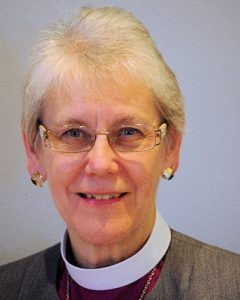
“I lift up my eyes to the hills. From where will my help come?” (Psalm 121:1) This cry speaks to our hearts as we look at the world around us. We look outward on a world full of uncertainties where fear may be close at hand. Rising food prices force harder choices for many families. Violence seems more frequent at home and around the world as hatred and pain lead people to randomly kill innocent victims in the most ordinary of places—a grocery store; at work; on a street; in a place of worship. War can be instigated when a political leader decides they want more and invades their neighbour. Earthquakes strike with devastating force. Our hearts carry the fear of something unknown just around the corner—maybe another COVID-19 variant. And dioceses and parishes face human and financial resource challenges that threaten our ways of being church. Our hearts are overwhelmed and we cry with the psalmist, “From where is my help to come?”
The disciples knew this kind of fear as they faced the arrest and crucifixion of Jesus. Their hopes were rooted in his message about the love of God and his attention to the plight of their people. Now he was dead, and with him all their hopes and dreams. They too may have cried out, “From where is our help to come?”
We cannot see the future, even when we may think we can detect its direction. The pandemic taught us flexibility, as any plan could be disrupted by a lockdown or quarantine. But anxiety and fear remain close.
There is a place from which our help comes. “My help comes from the Lord, who made heaven and earth.” (Psalm 121:2) Our help is in God alone. In the midst of so many uncertainties the still point is God—our creator and redeemer. We are not promised certainty; or prosperity; or personal security. We are promised that wherever we are God is there with us, showing us how to live without retaliation, vengeance, anger, desperation or fear. With the help of God’s Spirit and grace we face the future. God invites us to do that together with God and with each other.
The early church gathered around the Eucharist and in prayer. Human beings are created to live in community, to need the strengths and gifts of each person and in relationship with God. The pandemic showed us our interdependence as it also showed us our inextricable links with others around the world. We need one another. We find strength in and with our neighbour and renewed hope.
The disciples stayed together after the resurrection for support, encouragement, prayer and remembering, around the table, the power of the body and blood of Christ raised to life again. In my journeys around the Anglican Church of Canada and the Anglican Communion I have seen the abundance of gifts and resources we have when working together to face our fears and uncertainties. We learn from and with one another as we support each other. We have prayer that, like a life jacket, buoys us up and holds us in the presence of God.
There may be suffering or struggle in our future. It will not be easy to endure at times. We have not been promised that we will be rescued from every grief, pain or evil. We are and will be affected by the choices of our ancestors and those around us. However, in their midst we are always with God.
The resurrection of Jesus is God’s promise that nothing, not even death, will have the last word. St. Paul would later write, “If we live, we live to the Lord, if we die, we die to the Lord; so then whether we live or whether we die we are the Lord’s” (Romans 14:8)—words that give us freedom to face the future unafraid. Paul also wrote,
I am sure that neither death, nor life,
nor angels nor principalities
nor things present nor things to come nor power nor height nor depth
nor anything else in all creation
will be able to separate us
from the love of God in Christ Jesus our Lord.
(Romans 8:38-39)
To God’s assurance of hope, let our response be “Alleluia, Alleluia, Alleluia.”





